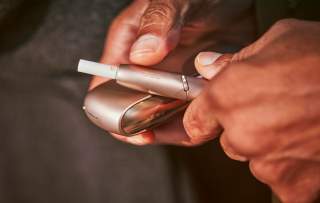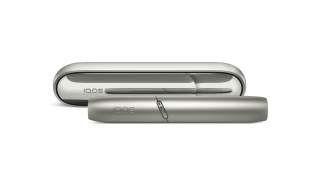IQOS is Not a Cigarette or Vape, So What is It?
It's a well-known fact that cigarette smoking is harmful. It causes serious disease and is addictive, but technological innovation has enabled the development of different smoke-free alternatives, some of which have been scientifically substantiated to be a better choice than continuing to smoke cigarettes.
Smoke-free products deliver nicotine without burning tobacco and do not generate smoke – hence the name smoke-free. Instead, they produce an aerosol that is fundamentally different to the smoke of burning tobacco. Examples include e-cigarettes or vapes and heated tobacco products such as IQOS.
While these options have been available for some time, there is still some confusion as to what exactly they are and the differences between them.
“This is partly due to widespread misinformation about smoke-free products, and in South Africa partly due to the current regulatory framework which limits adult smokers from receiving accurate and non-misleading information about heated tobacco products,” says Rishaad Hajee, Head of Corporate Communications at Philip Morris South Africa.
“To maximise their public health benefit, there needs to be a wide range of smoke-free alternatives with different characteristics, giving adult smokers who would otherwise continue to smoke a suite of products to choose from, addressing different preferences so they can fully switch,” he says. “We are often asked if IQOS is a vape? The answer is quite simply, no, IQOS is not a vape.”
He explains that IQOS heats real tobacco without burning it, while vapes heat a liquid which often contains nicotine, neither produce smoke or ash because they don’t burn tobacco.
“IQOS is an alternative for adult smokers who would otherwise continue to smoke and who prefer the taste of tobacco when considering less harmful smoke free products,” he adds. “Scientifically substantiated smoke-free products can significantly reduce the levels of harmful chemicals compared with cigarette smoke.”
It is widely accepted among harm reduction experts that delivering nicotine without burning tobacco is a positive development for smokers who would otherwise continue smoking. It is the high levels of harmful chemicals, which are the primary cause of smoking-related disease and these are generated from burning tobacco and found in cigarette smoke.
He points out that, IQOS emits, on average, 95 percent of lower levels of harmful chemicals compared to the smoke of a reference cigarette. “While this does not necessarily equate to a 95 percent reduction in risk. IQOS is not risk-free and contains nicotine, which is addictive, smoke-free products are for adult smokers who would otherwise continue to smoke.”
“The totality of scientific evidence available for IQOS in comparison with continued smoking shows that, while not risk-free, switching completely to IQOS is less harmful than continuing to smoke cigarettes,” he adds. “However, to restate the obvious: quitting tobacco and nicotine altogether is – of course - the best choice any smoker could make.”
He explains that smoke-free products have the potential to accelerate the decline in smoking rates. “When scientifically substantiated and appropriately regulated, this will ensure that smokers have correct information and access to this information and it is our ambition to replace cigarettes with these products as soon and as fast as possible.”
Tobacco Regulation Needs to Keep Pace with Innovation
More regulation and taxation alone will not be enough to end smoking says, Philip Morris South Africa
The draft Control of Tobacco Products and Electronic Delivery Systems Bill, will not effectively reduce cigarette sales or smoking-related harm in the country, according to Philip Morris South Africa.
The Bill is fiercely debated and there have been calls by some to accelerate its implementation.
“On one side of the debate are those who would see less harmful nicotine products including e-cigarettes, heated tobacco products and snus, regulated the same as the most harmful products, namely cigarettes,” says Rishaad Hajee, Head of Corporate Communications at Philip Morris South Africa. “This approach doesn’t consider the growing body of scientific evidence which shows that not all nicotine-containing products are the same and turns a blind eye to the principle of tobacco harm reduction.”
Hajee explains that tobacco harm reduction (THR) is the principle of replacing cigarettes, which are known to be the most harmful form of nicotine consumption, with smoke-free products that are better alternatives for those adults who would otherwise continue to smoke. “These alternatives are not risk-free but can be a much better choice than cigarettes. The burning of tobacco produces the vast majority of harmful chemicals in cigarette smoke, and by eliminating the burning process—as is the case with these products—the levels of harmful chemicals generated can be significantly reduced compared with cigarette smoke,” he adds.
Public health experts agree that the harmful chemicals released from burning tobacco are the main cause of smoking related diseases, not nicotine. While they contain nicotine, which is addictive and not risk free, smoke-free alternatives generate lower levels of harmful chemicals and have an important role to play in reducing the health burden caused by smoking cigarettes.
In Japan, between 2015 and 2019, the total cigarette sales in Japan dropped by 34%, which can be associated with the introduction of heated tobacco products.
“South Africa can achieve similar success if it implements regulatory frameworks that recognise that not all tobacco products are the same,” Hajee explains. “Sensible regulation is key to striking the right balance. This means adopting regulation that recognizes the role of these alternatives in helping those adults who would otherwise continue to smoke to move away from cigarettes, while protecting youth and non-smokers.”
The draft Bill was first published in 2018 and did not treat alternative nicotine-containing products differently from cigarettes. Hajee states that this indicates that South Africa’s tobacco regulations are not keeping pace with science and innovation and are not including tobacco harm reduction as part of the strategy for tobacco regulation or policy-making.
“The Control of Tobacco Products and Electronic Delivery Systems Bill is the perfect opportunity for regulators to review the evidence and facts,” he says. “With the right regulatory encouragement and support from civil society, and the medical and scientific community, cigarette sales can end sooner."
“Scientific evidence and transparency remain our strongest tools to achieve this and enable people to make informed decisions,” Hajee adds. “The 11 million men and women who smoke in South Africa deserve nothing less.”
-- ENDS --
Issued on behalf of Philip Morris South Africa
Philip Morris International: Delivering a Smoke-Free Future
Philip Morris International (PMI) is leading a transformation in the tobacco industry to create a smoke-free future and ultimately replace cigarettes with smoke-free products to the benefit of adults who would otherwise continue to smoke, society, the company, its shareholders and its other stakeholders. PMI is a leading international tobacco company engaged in the manufacture and sale of cigarettes, as well as smoke-free products, associated electronic devices and accessories, and other nicotine-containing products in markets outside the U.S. In addition, PMI ships versions of its IQOS Platform 1 device and consumables to Altria Group, Inc. for sale under license in the U.S., where these products have received marketing authorizations from the U.S. Food and Drug Administration (FDA) under the premarket tobacco product application (PMTA) pathway; the FDA has also authorized the marketing of a version of IQOS and its consumables as a Modified Risk Tobacco Product (MRTP), finding that an exposure modification order for these products is appropriate to promote the public health. PMI is building a future on a new category of smoke-free products that, while not risk-free, are a much better choice than continuing to smoke. Through multidisciplinary capabilities in product development, state-of-the-art facilities, and scientific substantiation, PMI aims to ensure that its smoke-free products meet adult consumer preferences and rigorous regulatory requirements. PMI’s smoke-free product portfolio includes heat-not-burn and nicotine-containing vapor products. As of June 30, 2021, PMI’s smoke-free products are available for sale in 67 markets in key cities or nationwide, and PMI estimates that approximately 14.7 million adults around the world have already switched to IQOS and stopped smoking. For more information, please visit www.pmi.com and www.pmiscience.com.
Heated Tobacco is Driving Cigarette Sales Down
The growth of heated tobacco products (HTPs) is increasing and in markets like Japan, is likely causing a decline in cigarette sales.
A recent whitepaper report, conducted by Frost & Sullivan - ‘Tobacco Harm Reduction and Novel Nicotine and Tobacco Products: Evidence from the Japanese Market’ shows that the sale of conventional cigarettes in Japan has reduced by 34 percent between 2015 and 2019. It states: “It is likely that the introduction of HTPs in Japan has caused a significant decline in cigarette sales, well above the previous rate of decline.”
According to the report, from 2011 to 2016, sales of cigarettes declined by about 2-4 percent annually, while a decline of 13 percent in cigarette sales occurred in 2017, 12 percent in 2018, and 9 percent in 2019, indicating a much more significant decline over this period. It concludes that the accelerated decline in cigarettes-only sales in Japan since 2016 corresponds to the introduction of and growth in the sales of HTPs.
IQOS, Philip Morris International’s leading heated tobacco product, was first available in Japan from 2014 with a limited launch followed by a full roll out by April 2016.
“These findings suggest that scientifically substantiated smoke-free alternatives, such as IQOS, have a role to play in providing smokers who don’t quit with less harmful alternatives than cigarettes,” says Philip Morris South Africa’s Managing Director, Branislav Bibic. “There is a real opportunity in South Africa to look at how this decline was achieved, and the regulations implemented by the Japanese government to make this possible in the interest of public health.”
The whitepaper report states that “the Japanese government is differentiating HTPs from conventional cigarettes in regulations, with HTPs generally receiving less-stringent regulatory settings than conventional cigarettes.”
Most notably Bibic adds that the introduction of HTPs has not caused an increase in overall sales of tobacco products, and the availability of HTPs has had a low impact on the initiation of tobacco use by never-smokers and re-initiation by former smokers.
He explains that HTPs are less harmful than smoking cigarettes because they heat tobacco instead of burning it. “Burning tobacco releases harmful chemicals which experts agree are the main cause of smoking-related diseases. “IQOS produces 95% lower levels of harmful chemicals compared to the smoke of a reference cigarette,” he says. “IQOS is not risk-free, and this doesn’t necessarily equate to a 95 percent reduction in risk, but it is a better choice than continuing to smoke.”
Bibic adds that since IQOS does not burn tobacco, it doesn’t produce tar which is one of the most harmful elements of cigarette smoke. It generates an aerosol that is fundamentally different from “tar” and consists of significantly lower levels of harmful chemicals compared to cigarette smoke.
“There are 11-million adult smokers in South Africa, which is almost one-fifth of the population, most of whom will continue to smoke cigarettes,” he explains. “Regulations that enable adult smokers to understand why these products are different from cigarettes, and that encourage those who would otherwise continue smoking to change to less harmful alternatives are needed in South Africa to accelerate the decline of smoking.”
For more information visit: www.iqos.co.za
-- ENDS --
Issued on behalf of Philip Morris South Africa.




